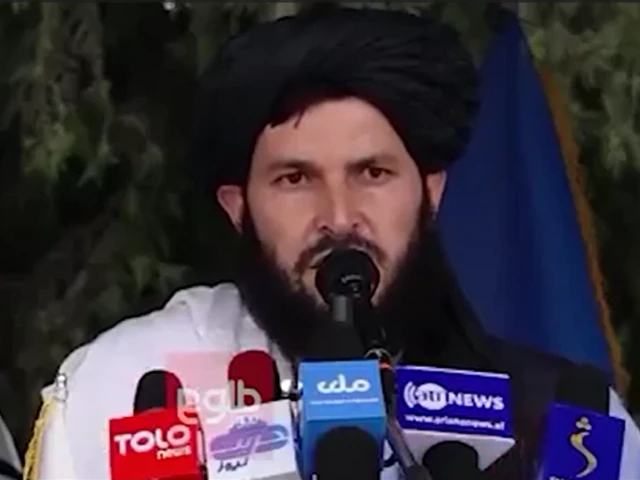Afghan Taliban tell ‘Khawarij’: Carrying out attacks in Pakistan is not jihad
Only the state has the authority to declare jihad—not individuals or groups: Saeedullah Saeed

Senior Afghan Taliban commander Saeedullah Saeed has warned militant factions against unauthorized jihad, particularly in Pakistan, saying such actions are against Shariah and the orders of the Islamic Emirate's leadership.
Speaking at a police passing-out ceremony, Saeed said that fighting in any country, including Pakistan, without the explicit command of the Amir is impermissible.
“Joining various groups to wage jihad abroad does not make one a true mujahid,” he stated. “Only the Amir of the state has the authority to declare jihad—not individuals or groups.”
Saeed emphasized that those carrying out attacks independently or moving between regions to conduct operations cannot be classified as legitimate fighters under Islamic law. “Jihad based on personal ego or group loyalty is considered fasad (corruption), not legitimate resistance,” he added.
Read more: Afghanistan cracks down on elements targeting Pakistan
He further stated that the Afghan leadership has prohibited unauthorized entry into Pakistan, and any such act constitutes disobedience. “Groups attacking in the name of jihad are defying both Shariah and the authority of the Afghan Emirate,” he warned.
Security analysts in Pakistan welcomed the statement, saying it reinforces the country’s counterterrorism narrative, domestic stability, and diplomatic positioning.
Defense experts also noted that India-backed proxies operating under the name of Khawarij are engaged in activities that amount to terrorism, not religious struggle, further destabilizing the region.
Earlier, while much of the public remained focused on tensions between Pakistan and India, Islamabad and Kabul quietly worked to reset their troubled relationship during the same period.
This led to deeper engagement between the two capitals, as the interim Afghan government took a series of unprecedented steps — including, for the first time, cracking down on elements that encouraged Afghan nationals to carry out cross-border terrorist attacks.
The presence of the banned Tehreek-e-Taliban Pakistan (TTP) and other groups posing a threat to Pakistan had long strained ties between the neighboring countries. However, for the first time, Pakistan observed a shift in Kabul's approach when a delegation led by Special Envoy on Afghanistan, Ambassador Muhammad Sadiq Khan, visited the Afghan capital in the third week of March. The delegation was briefed on the measures Kabul had taken to curb cross-border terrorism.
Sources privy to the closed-door discussions told The Express Tribune that this time the Taliban appeared serious. They confirmed that the Afghan Taliban had begun a crackdown on their nationals who had either joined the TTP or were planning to do so. Individuals, particularly those involved in recruiting others for the TTP, were jailed and prosecuted.
Read more: 54 terrorists killed as security forces thwart major infiltration attempt
The Taliban government won Pakistan's confidence after it apprehended certain Afghan nationals who facilitated over 70 terrorists, mostly Afghan, trying to infiltrate into Pakistan soon after the Pahalgam attack.
However, Pakistan's timely action neutralised all of them at the border near North Waziristan in the biggest encounter with terrorists in a single day since Pakistan's war on terror after the 9/11 attacks.







1724319076-0/Untitled-design-(5)1724319076-0-208x130.webp)















COMMENTS
Comments are moderated and generally will be posted if they are on-topic and not abusive.
For more information, please see our Comments FAQ